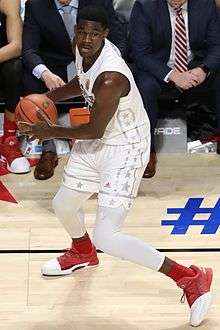Karl Malone Award
| Karl Malone Award | |
|---|---|
| Given for | The nation's top male power forward in NCAA Division I basketball |
| Country | United States |
| Presented by | Naismith Memorial Basketball Hall of Fame |
| History | |
| First award | 2015 |
| Most recent | Deandre Ayton, Arizona |
| Website | http://www.hoophallawards.com/ |
The Karl Malone Power Forward of the Year Award is an annual basketball award given by the Naismith Memorial Basketball Hall of Fame to the top men's collegiate power forward. Following the success of the Bob Cousy Award which had been awarded since 2004, the award was one of four new awards (along with the Jerry West Award, Julius Erving Award and Kareem Abdul-Jabbar Award) created as part of the inaugural College Basketball Awards show in 2015.[1] It is named after 14-time NBA All-Star, 11-time All-NBA First Team player Karl Malone.[2] The inaugural winner was Montrezl Harrell.[3]
Winners

DeAndre Ayton was the most recent winner of the Karl Malone Award in 2018.
| * | Awarded a National Player of the Year award: the Naismith College Player of the Year or the John R. Wooden Award |
| Player (X) | Denotes the number of times the player has been awarded the Karl Malone Award |
| Season | Player | School | Class |
|---|---|---|---|
| 2014–15 | Montrezl Harrell | Louisville | Junior |
| 2015–16 | Georges Niang | Iowa State | Senior |
| 2016–17 | Johnathan Motley | Baylor | Junior |
| 2017–18 | Deandre Ayton | Arizona | Freshman |
Winners by school
| School | Winners | Years |
|---|---|---|
| Arizona | 1 | 2018 |
| Baylor | 1 | 2017 |
| Iowa State | 1 | 2016 |
| Louisville | 1 | 2015 |
Notes
- ↑ "New College Basketball Awards Show to Honor the Season's Top Players April 10 on ESPN2". Naismith Memorial Basketball Hall of Fame. February 12, 2015. Archived from the original on November 20, 2015. Retrieved October 19, 2015.
- ↑ "Sixteen Candidates Announced for First-Ever Karl Malone Award". Naismith Memorial Basketball Hall of Fame. February 17, 2015. Archived from the original on October 24, 2015. Retrieved October 19, 2015.
- ↑ Vecenie, Sam (May 8, 2015). "Montrezl Harrell could become an elite NBA role player in time". CBS Sports. Retrieved October 19, 2015.
External links
This article is issued from
Wikipedia.
The text is licensed under Creative Commons - Attribution - Sharealike.
Additional terms may apply for the media files.